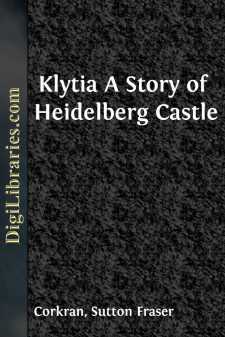Categories
- Antiques & Collectibles 13
- Architecture 36
- Art 48
- Bibles 22
- Biography & Autobiography 813
- Body, Mind & Spirit 142
- Business & Economics 28
- Children's Books 17
- Children's Fiction 14
- Computers 4
- Cooking 94
- Crafts & Hobbies 4
- Drama 346
- Education 46
- Family & Relationships 57
- Fiction 11829
- Games 19
- Gardening 17
- Health & Fitness 34
- History 1377
- House & Home 1
- Humor 147
- Juvenile Fiction 1873
- Juvenile Nonfiction 202
- Language Arts & Disciplines 88
- Law 16
- Literary Collections 686
- Literary Criticism 179
- Mathematics 13
- Medical 41
- Music 40
- Nature 179
- Non-Classifiable 1768
- Performing Arts 7
- Periodicals 1453
- Philosophy 64
- Photography 2
- Poetry 896
- Political Science 203
- Psychology 42
- Reference 154
- Religion 513
- Science 126
- Self-Help 84
- Social Science 81
- Sports & Recreation 34
- Study Aids 3
- Technology & Engineering 59
- Transportation 23
- Travel 463
- True Crime 29
Klytia A Story of Heidelberg Castle
Description:
Excerpt
At a time when in our fatherland a cold raw wind made its presence felt, and the sharp frost at night checked the growth of the early bud, the Rhine valley between the Bergstrasse and Hardtgebirge had revelled for many weeks in the timely spring, the especial privilege of this garden of Germany. Even three hundred years ago at the time of our narrative the Neckar valley shimmered with the white and red blossoms of the various fruit-trees and yellow fields of rape, as if spring had wished to see how an illumination looked by day. The Jettenbühl above Heidelberg which to-day resembles a green velvet pillow, on which the ruins of the castle stand out like an offering to some Deity, was at that date but a bare glacis, surmounted by massive turrets and angular fortresses, the palace of the Kurfürsts of the Palatinate looming out severe and threatening over the smiling valley of Heidelberg, as does at the present time the gloomy residence of the Popes over Avignon, or the menacing Ehrenbreitstein over the green Rhine. Between the octagonal belfry and the "thick Tower" of which at the present time only the inner walls are visible, the gorgeous palaces of Frederic IV. and Frederic V. did not exist, but on the right the peaky gables of the Chapel and of the roof of the old castle reared above the scarped fortress wall; "the new court," erected by Frederic II., was built against the octagonal tower.
In the low but spacious halls of the building which by its mixture of the Gothic and Renaissance schools recalls to the memory the Flemish architecture of the period, a numerous throng crowded together seeking an audience of the Kurfürst, in the latter part of a spring afternoon of the year 1570. Before the door of the Prince stood the portly court-servant Bachmann, attired in the resplendent livery of a Heiduck of the Pfalz, his jovial expression forming a pleasing contrast to the grim heraldic lions ornamenting his breast. Solemnly did he call out the names of those to whom an audience was granted. Huguenots from France begging for aid. Theologians warmly recommended to the notice of the Kurfürst, wandering Scots eager for service, Italian artists who had obtained commissions were received in order, and dismissed. Finally, there remained but two couples, widely differing in appearance, representatives of the two classes which everywhere throng the ante-chambers of sovereigns, resembling in their demeanour Grief and Hope.
The two "Hopefuls" paced up and down the now empty hall in lively discussion, whilst the two sorrowful guests sat sullenly in a corner. One of these, addressed as Your Reverence, was an undersized well fed man with fresh ruddy complexion and coarse features. His companion, on the other hand, was a small dwarf-like being, whose dark costume stood out in marked contrast to his fiery-red-face, one of those figures only to be met with at the interment of a circus-rider. With a deep sigh the dwarf addressed his reverend companion: "Yes, yes. Your Reverence. How often have I, as counsellor of our beloved ruler, shortened with my timely jokes the dreary hours of many awaiting an audience, who, even if not favourably received, nevertheless laughed at my excellent quibbles. At that time I little thought, that I myself should have to sit here and beg for a small pension."
"We both owe our misfortunes to that vagabond Olevianus," said the Parson. "Because I defeated him in a public argument--he knows as much about theology as your cow does of a bag-pipe--and because he cannot bear to see how I filled my church, therefore has he deprived me of my position in the Church of St. Peter, leaving me only matins in the Holy Ghost, which no one ever attends. But that will help him little, let but the Heidelbergers have to choose between me and Olevianus and we shall see who gets the most votes. That he well knows, and on that account am I stuck in the background. But I seek an audience and intend to speak out my mind to the Kurfürst, although he does not like to hear the truth."
"Our day is over, Herr Neuser," said the discharged Court-fool; "these are the people who now have full swing," and he grimly pointed to the other couple, a well dressed old Italian with a head like a fox, listening covertly to anything said in his neighbourhood, whilst at the same time he earnestly addressed a young man, who appeared from his long locks and Raphael-cap to be an artist....


